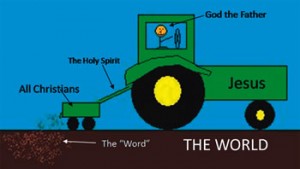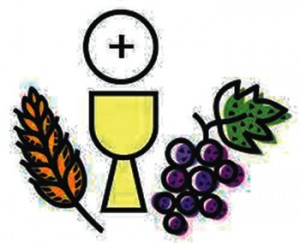Opening up to God
 "Out of his infinite glory, may he give you the power through his Spirit for your hidden self to grow strong, so that Christ may live in your hearts through faith, and then, planted in love and built on love, you will with all the saints have the strength to grasp the breadth and the length, the height and the depth; until knowing the love of Christ, which is beyond all knowledge, you are filled with the utter fullness of God." Ephesians 3: 16-19
"Out of his infinite glory, may he give you the power through his Spirit for your hidden self to grow strong, so that Christ may live in your hearts through faith, and then, planted in love and built on love, you will with all the saints have the strength to grasp the breadth and the length, the height and the depth; until knowing the love of Christ, which is beyond all knowledge, you are filled with the utter fullness of God." Ephesians 3: 16-19
The Second Vatican Council declared Catholics to be Eucharistic People and the People of God. These collective terms give us some post-Vatican II idea of who are in an increasingly secular world. They unite us to a worldwide body of Catholicity, which though it has visible local nuances, has a universal faith life when it comes to the hidden self growing strong.
It seems at times today that God and the Eucharist are just two backdrops in front of which we act out our local Catholic lives. That we have a hidden self that must grow strong, that this life is sacred and needs nurturing somehow seems to have been forgotten. We remain busy however, occupying our Christian lives with a host of activities all of which are good.
Such business is failing to bring God and the Eucharist into the centre of our lives, our childrens’ lives and the lives of citizens in general. The ground we once occupied in the culture of the nation is lost. Christian culture is now just one culture amongst many, all of which are equal. We find ourselves pushed back into the thinning soil of parish life and begin to feel the difficulties of evangelising in a world which is hostile to Christian outreach.
The Church exists to evangelise. A Catholic life which does not evangelise is like a consumer product which has become so user friendly that it fails to do what it is supposed to do. Could it be that allowing what is sacred in us to grow strong has something to do with evangelising? In the face of local nuances threatening the growth of early Christian communities St Paul found it necessary not just to preach but to pray that early Christians would accept that the action of knowing and somehow internalising the person of Jesus Christ was to be their primary concern.
In convening the Second Vatican Council Pope John XXIII saw a new way for the Church in the modern world to evangelise. Take a lay life, most probably that will be a married life, invite it to be holy and missionary. Invite every lay person to open his or her heart to the lively presence of Jesus Christ in the hope of knowing the utter fullness and friendship of God.
Secular culture is hostile to institutionalised Catholicism. Thankfully a seed of interest in sacredness remains rooted in the general population. The world does not use the word sacred much but instead talks about spirituality and seems to be most interested in Eastern forms of this. That Catholic life has a universal spirituality seems not to be known. To embrace this interest in sacredness a lay person needs not so much a Catholic identity, as our parents once had, or a ministry as so many now have, but an everyday spirituality on the streets. Ordinary, everyday life, the life that is morally good needs to be attractive to secular life. Paradoxically this life needs to be more Eucharistic, more Godly.
Lay spirituality, (and I hesitate to call it that,) performs a basic but hidden function in society in that it creates a base soil of what Pope John Paul II called “original gospel morality.” This is livelier than the strict moral code which worked in the past. In this base soil of everyday “original gospel morality” all citizens may potter, dig around and discover, often subconsciously, what it means to be a person, not a Maori person or a gay person or a Muslim person just a person, raised up from the animal kingdom, able to love and be loved.
There is nothing new in this spirituality, apart from the fact that it is always new and powerful in that it has the life of Jesus Christ at its centre. It is no more or less common or garden discipleship lived on a grand scale, brought into being by the laity tilling the soil of everyday life to make it rich and full of evangelising goodness.
Local churches that want to evangelise but do not teach the laity how to till grow small. We often say it is better to give than receive when it comes to evangelising we cannot give to others what we are closed off to receiving ourselves, perhaps not in our heads but in the deepest recesses of our hearts. This latter part of our being is where the light of faith, the joy of hope and the largesse of love must be received. The most common way lay people close off to receiving these gifts from God is to refuse to till the soil of everyday life thinking that God has much more important, sophisticated works to be done. 
A lay person who tills does not aim directly at making her hidden self strong, even less does she aim at formulating a moral code or a lay spirituality for others. She lovingly tills the soil around her heart so that her hidden, sacred self gracefully takes root and begins to grow into the more visible aspects of her daily life. She tills with the help of the sacraments in which she finds the person of Jesus Christ utterly and immanently present, busting out of the rites, overflowing into her heart and every aspect of her humdrum life. Thus her tilling is sacramental and brings her to some rudimentary knowledge of her unknown God.
If this whole idea of welcoming an unknown God into her hidden self brings feelings of discomfort, fear of the Lord and doubt then she knows she has begun to love God as God loves her. It is very important in her discomfort to remain focussed on the Eucharist and worship of God. She must not spend too much time talking about her experiences in fellowship groups. She must be like Mary and ponder them in her heart, deeply tilling the soil nearest to the sorest, darkest part of her very being, the hidden part she often cannot share with any other human being. A pondering, tilling prayer might go like this.
I do want to be utterly open to you God but I doubt my ability to believe in you and to love you in a way that brings your light, love and joy into my life. It is not that I am afraid of you God but that I fear my worthiness to receive you into my heart.
The Church teaches us that the reward of this tilling life is discovered in heaven. However God being God can touch a tiller on earth if he so chooses. One Friday an old man who had tilled faithfully, joyfully and lovingly through his lay life had a profound sense on receiving Holy Communion that the bread and wine was a person, a friend who was there for him no matter the state of the Church or the world.
He felt like he was remembering something primitive, some source of Love that existed beautifully and utterly below the levels of his knowledge about God, his emotions and somehow even his capacity for memory. He was grounded in this touch of God, nothing being taken away from his human nature. At the same time he felt that sort of loftiness that comes to a soul which knows for a moment in time what the utter fullness of God looks like and feels like.
 Entries(RSS)
Entries(RSS)